HEINEKEN working to fend off tomorrow’s problems
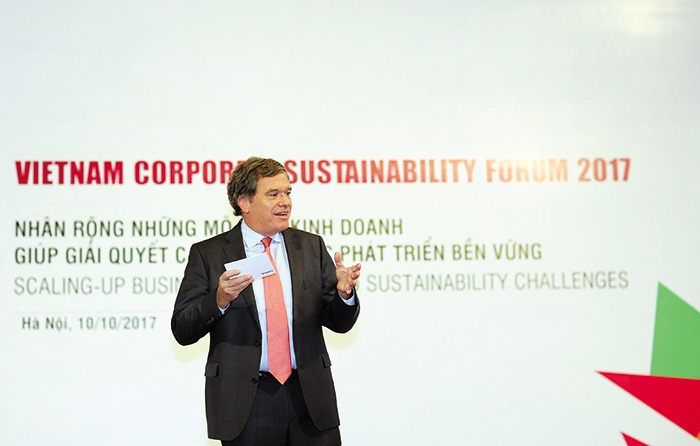 |
| Leo Evers, managing director of HEINEKEN Vietnam |
HEINEKEN Vietnam has been recognised as the most sustainable company in Vietnam for the second consecutive year. Which part of your sustainability agenda do you think sets you apart?
The award is such a wonderful honour for everyone at HEINEKEN Vietnam. We are proud of the fact that sustainability is part of our core business strategy. I think this is a crucial aspect of having a good sustainability agenda and it means it truly covers your entire value chain from manufacturing through distribution to consumption. Sustainability is not only the right thing to do, but it has also proven to be good for our business. Moreover, HEINEKEN’s global and local Vietnamese sustainability strategy is designed to support eight out of 17 of the United Nations’ Sustainable Development Goals (SDGs) and the National Sustainability Agenda. In the long run, I believe that this approach will help enhance corporate and national productivity and competitiveness in Vietnam, which has also been emphasised by Deputy Prime Minister Vuong Dinh Hue at the Corporate Sustainability Index Awarding ceremony last month in Hanoi.
Sometimes the choice of sustainable development may conflict with profit growth. As part of its sustainability efforts, HEINEKEN asks consumers to drink with moderation and not to drink and drive, in your “When you drive, never drink” campaign. Does this campaign create any conflicts with your business growth target? Have you seen any major impacts on consumer behaviour?
As a leading brewer in Vietnam, we understand our responsibility and opportunity to drive behavioural change related to responsible consumption, including moderate drinking and drink driving, via our brands. Regardless of any impact on sales, we need to drive a more responsible drinking culture and help reduce drink driving – that is the only way we will be a sustainable business in the long term. Last year we invested VND16 billion ($700,000) in communicating the message to drink responsibly to more than 10 million Heineken and Tiger fans. However, behavioural change requires long-term commitment and a roadmap with dedicated partners from the government and the private sector. We are proud to partner with the National Traffic Safety Committee (NTSC) on our “When you drive, never drink” campaign to extend the reach and impact of this campaign.
This year, we have brought this campaign to the next level by launching 37 flagship outlets in Hanoi and Ho Chi Minh City to redesign the drinking environment at outlets, reminding consumers that “When you drive, never drink.” This initiative has been implemented in partnership with a leading behavioural design expert, Sille Krukow. For the past two years, her global team of behavioural change designers has worked with Heineken to conduct research on drink driving and develop solutions to tackle this issue for many markets, including Vietnam. Last month, she came to Vietnam to present her insights on behavioural change to nearly 200 NTSC officers. Together with other solutions, including roundtrip Grab codes for drinkers and training workshops for Vietnamese students, we are confident that this year’s campaign will obtain positive results on changing drink driving behaviour. However, to see real, meaningful long-term change, we need to keep running these campaigns consistently for many years. That is why we have partnered with NTSC since 2008 and will continue to actively advocate responsible drinking.
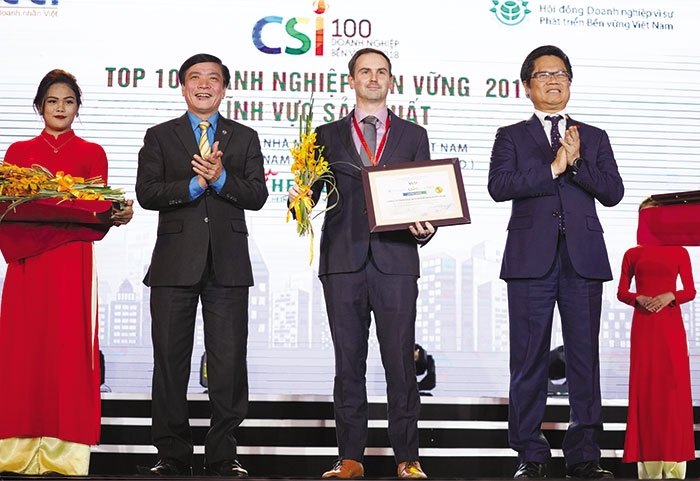 |
| HEINEKEN Vietnam has been honoured as the most sustainable company for the second consecutive year |
Not all businesses can afford to choose sustainable development in the long run over short-term business growth, even though this is the right thing to do. This dilemma is apparent via the dilemma between plastic packaging versus environmentally friendly packaging, or traditional fuel versus renewable energy. How can HEINEKEN Vietnam overcome this hurdle?
We understand the challenges that might present themselves when an organisation chooses to operate sustainably. However, in our experience, there are often innovative and sustainable solutions that actually benefit your business at the same time. To give you one example, when we switched from using diesel boilers to power our breweries to using clean biomass energy, this initiative was not only good for the environment and the local community, but also to our business. To generate biomass energy, we sourced approximately 54,000 tonnes of rice husk and woodchips from farmers in 2017. This allows us to provide substantial income for Vietnamese farmers and support the development of the biomass energy industry in Vietnam. Moreover, we managed to brew 100 per cent with carbon neutral renewable energy at four of our six breweries, halve our CO2 emissions compared to using fossil fuel, and reduce our fuel cost by approximately 30 per cent.
I heard a great quote the other day: “Today’s problems are often yesterday’s solutions” – it is really very true, particularly with regards to plastic packaging. We need to think very carefully about what may seem like the “easy” solution today as in reality it could end up costing us much more in the long term.
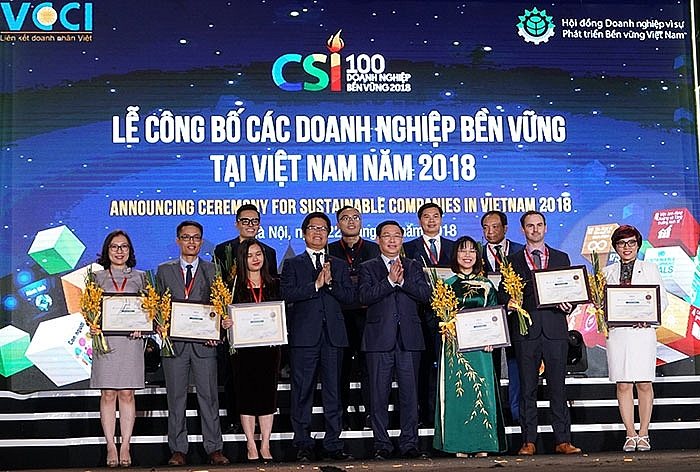 |
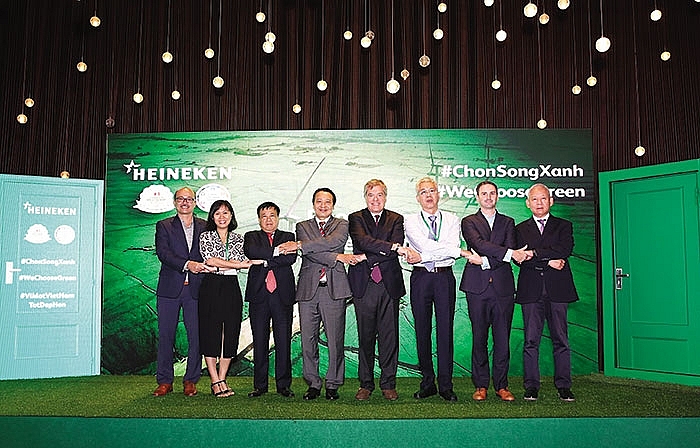 |
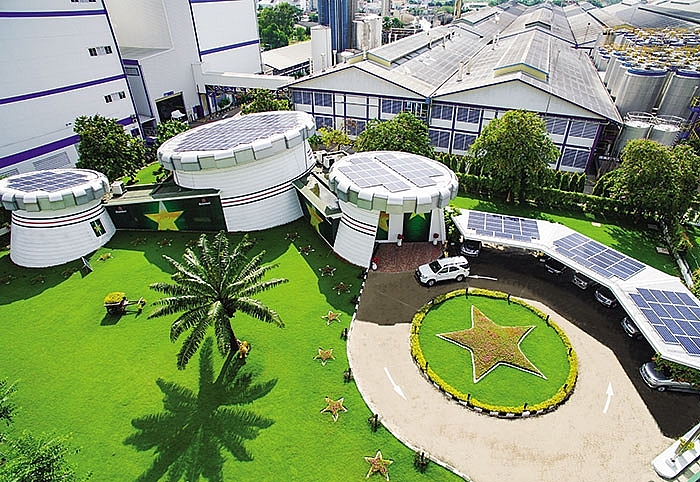 |
Most businesses are still unfamiliar with comprehensive sustainability approaches such as the circular economy model or zero waste to landfill. What would you recommend to encourage more businesses to follow sustainability practices and ultimately support UN SDGs in Vietnam?
Many organisations still think that sustainability requires a large budget that only multinational companies can afford, whereas in reality sustainability is all about intent and commitment, as well as finding innovative solutions. A report by the World Business Council for Sustainable Development also showed that sustainable development can enable businesses to gain up to $12,000 billion, and create up to 380 million new jobs around the world by 2030. As seen in my biomass example, the right solution will actually benefit your business as well as the environment and local community.
A very good way to follow sustainable practices is to learn from other businesses who have done them via forums such as the Vietnam Business Council for Sustainable Development (VBCSD). VBCSD creates a community for us to exchange best practices with others, co-operate and support one another. It gives us a framework and structure to enable these opportunities as well as inspiration for new ideas and ways in which we can continue our quest to be a more sustainable company and have an even greater positive impact.
Just this month, we held circular economy workshops for VBCSD members in Vietnam, led by renowned circular economist Leyla Acaroglu. This included some “train-the-trainer” sessions so that VBCSD and company staff can help others learn more about the circular economy approach.
Does HEINEKEN plan to further expand its sustainability initiatives and investment in the coming time? Are there regulatory or infrastructure challenges barring you from doing so?
One of our key sustainability targets to be achieved by 2020 is to brew 100 per cent from renewable energy at all six of our breweries. We look forward to increasing our renewable electricity mix, where improvements are required to the existing infrastructure and the regulatory framework to enable this. The sooner we can get the right regulatory framework in place, supported by the right infrastructure, and the commitment by relevant partners in the private sector, then we will see a significant acceleration in terms of renewable electricity in Vietnam. With that being said, the great news is that sustainability has received great attention and support in recent years, from the local community and especially the government of Vietnam.
What the stars mean:
★ Poor ★ ★ Promising ★★★ Good ★★★★ Very good ★★★★★ Exceptional
 Tag:
Tag:
Related Contents
Latest News
More News
- State corporations poised to drive 2026 growth (February 03, 2026 | 13:58)
- Why high-tech talent will define Vietnam’s growth (February 02, 2026 | 10:47)
- FMCG resilience amid varying storms (February 02, 2026 | 10:00)
- Customs reforms strengthen business confidence, support trade growth (February 01, 2026 | 08:20)
- Vietnam and US to launch sixth trade negotiation round (January 30, 2026 | 15:19)
- Digital publishing emerges as key growth driver in Vietnam (January 30, 2026 | 10:59)
- EVN signs key contract for Tri An hydropower expansion (January 30, 2026 | 10:57)
- Vietnam to lead trade growth in ASEAN (January 29, 2026 | 15:08)
- Carlsberg Vietnam delivers Lunar New Year support in central region (January 28, 2026 | 17:19)
- TikTok penalised $35,000 in Vietnam for consumer protection violations (January 28, 2026 | 17:15)






















 Mobile Version
Mobile Version